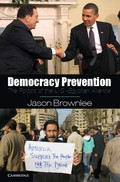2 - Mubarak's War on Terrorism
Published online by Cambridge University Press: 05 November 2012
Summary
Sadat's death launched Mubarak's rule. Egyptians welcomed a change of leadership – no matter its provenance – and U.S. policymakers realized they could no longer take the Egyptian president for granted. With renewed domestic and foreign support, Mubarak pursued a cautious foreign policy. He cooperated with the United States, communicated with Israel, and reached out to Arab states without ignoring Egyptian public opinion. The longer Mubarak stayed in power, however, the more he resorted to the repressive tactics of his forerunners. After a period of détente between the regime and Islamic militants associated with Sadat's assassination, the two sides plunged into an internal war. Mubarak eventually won, but only after cracking down on moderate, as well as radical, opposition. Under the aegis of antiterrorism, Mubarak consolidated his rule and blocked alternative movements from gaining control of government.
In the 1980s, U.S.-Egyptian relations fell and rose as the countries coped with hijackings at sea and in the air. In matters of war and peace, Egypt supplemented U.S. policy, such as in Lebanon and with the Iran-Iraq War. But the Egyptian-Israeli Peace Treaty had vitiated the heft of the Egyptian army in the Middle East and, after the Cold War ended in 1989, the Egyptian military role in Africa diminished. Soon trans-Atlantic intelligence sharing would matter far more than joint maneuvers on the Egyptian coast. Operation Desert Storm showcased the strategic contribution of the conventional Egyptian military, and it brought massive, and much needed, debt relief for Mubarak. The war to liberate Kuwait, however, did not change the reality of post–Cold War geopolitics: The United States was the sole superpower and its most audacious challengers were small cells of militants, not rival states. In the fight against those organizations, Egypt offered both partner and role model.
- Type
- Chapter
- Information
- Democracy PreventionThe Politics of the U.S.-Egyptian Alliance, pp. 43 - 68Publisher: Cambridge University PressPrint publication year: 2012



